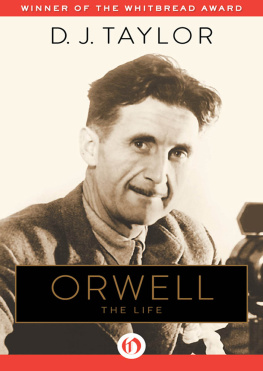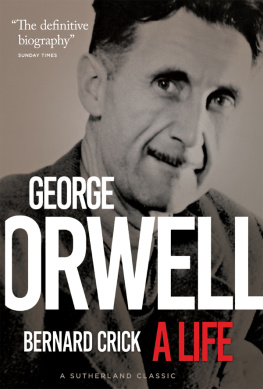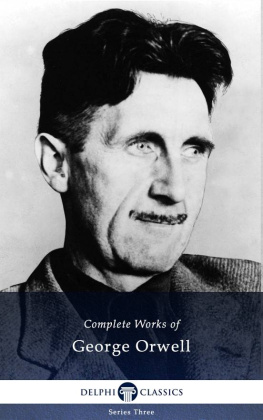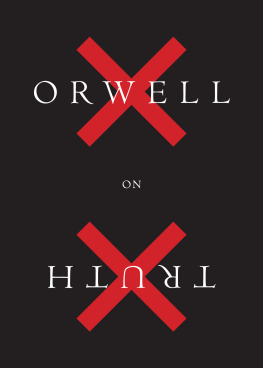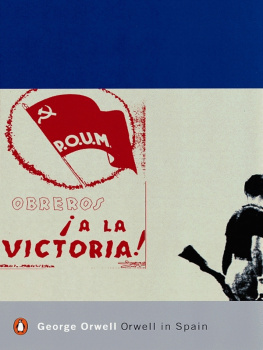ACKNOWLEDGMENTS AND REFERENCES
MY FRIEND WAYNE DONNELL of Greensboro, a literate man, provided important research materials at just the right moment in my preparations for this book, and I would like to begin my acknowledgments by thanking him.
My brother, Ed Ferrell, provided a base of operations and a source of good advice on research when I was in New York. Herb Katz of M. Evans, and Henry Morrison, formerly of Greenwich Village, both helped as I gathered some perspective on Orwell, as did Leslie Owen. Diane Gedymin saw to it that this book is so attractive.
Linda Cabasin of M. Evans proved once more her abilities as an editor. Her accessibility, insight, and sense of humor were as always invaluable.
Even more accessible were, and are, my wife Martha and my son Alec. They both heard more about George Orwell than they may have wished to hear, but I could not have written this book without them.
The major sources for this biography were these:
Bernard Cricks George Orwell: A Life (New York: Atlantic/Little, Brown, 1980). Professor Cricks book is exhaustive but not exhausting, a major biographical effort that is a pleasure to read and rewarding to contemplate. The volume of material examined and documented is staggering. The book is effectively organized, with a valuable long introductory essay that establishes the authors attitude toward his subject and his sources, while at the same time offering provocative comment and reflection upon the nature of biography. Professor Cricks knowledge of Orwell and Orwells work is equaled or surpassed by his understanding of political, social, and literary contexts. This is a fine close-up history of an era as well as an individual.
It was my pleasure to hear Bernard Crick speak as I was writing this book. His opinions are as sound and clear in person as on the page; so sound that when one disagrees with his conclusions, one is forced to think especially hard and carefully. Surely that is a sign of an important work, and an important writer. The last decade of Orwells life was, of necessity, treated only briefly in the present book. It was, however, a rich and event-filled time in Orwells life, to which fully a third of Professor Cricks book is devoted. Anyone who wishes to learn more about Orwell should turn immediately to George Orwell: A Life. Should the political context of that life appeal, Professor Cricks bibliography and a bibliography of Professor Cricks other distinguished works will serve well as guides.
Peter Stansky and William Abraham wrote a two-volume study of Orwells life through the Spanish Civil War. The Unknown Orwell (New York: Alfred A. Knopf, 1972) carries Orwell through the publication of Down and Out in Paris and London. Orwell: The Transformation (New York: Alfred A. Knopf, 1980) follows Orwell through his escape from Spain. Although the authors perhaps accept too much of Orwells own work as authoritative, their interpretation of his life and its psychological underpinnings is interesting. The books are clearly written and chronologically organized.
Jacintha Buddicom, Eric Blairs childhood friend, became a poet. Her reminiscence of their youth, Eric and Us (London: Leslie Frewin, 1974) is a poignant story that offers a gentle picture of the youth of Eric Blair and their friendship. While Eric and Us is a personal, rather than a documented, biography, it should prove of interest to all who wish to know more about the Blair from whom Orwell grew.
As with the subject of any literary biography, the best place for readers to learn more about the subject is with his own works. Eric Blair dreamed of a collected edition of his works, and that edition is becoming available now.
ONE INDIAN BIRTH, BRITISH BOYHOOD
ALTHOUGH ERIC ARTHUR BLAIR would earn his fame under the name George Orwell, the family name was illustrious enough in its own right. Blairs had done things, they had gone places, they had made their mark. By the time Eric Blair was born in 1903, however, it was clear to all that the marks made were less bold with each generation, and the familys fortunes were not on the rise.
The peak of the Blairs prestige had come four generations earlier, when Erics great-great-grandfather, Charles Blair, owned Jamaican estates and plantations. (He also owned a large number of slaves.) Charles Blair died in 1802, and the inheritance he left Erics great-grandfather, Charles Blair, Jr., was a large one; he was able to support his family comfortably. Thomas Richard Arthur Blair, Erics grandfather, was born in 1802, the second son in the family, and the prospects he faced were less grand.
Primogeniture: This was the ancient word and the rule by which in the stratified British class system of the early nineteenth century, the right of inheritance belonged exclusively to the eldest son. Younger sons must face the world on their own, meet its challenges with their own personal resources. All they received from their family was their name. Still, Blair was a good, well-connected name, and a young man in Thomas Richard Arthur Blairs position found himself with several appealing options.
There was the army, into which a young man of good family could enter as a second lieutenant, and expect to rise swiftly to an even higher rank. Or there was the life of a colonial officer, serving the crown in one of the outposts of the empire, handling bureaucratic and managerial details. A third choice was the Church of England, then as much a social as religious focus for society. Churchmen had prestige of their own, and the communities they served revolved around them. Failing to achieve a career in the church or in the military or colonial service, a second son might find himself sinking into one of the professions (law or medicine) which at that time carried little honor and less income.
After a protracted period of travel and service in various minor colonial positions, Eric Blairs grandfather chose the church. Thomas Blair found himself, at twenty-seven, in Calcutta, being ordained an Anglican deacon, studying for the priesthood. His travels continued, he revealed a talent for the clergy, and he rose in the ranks of the church. In 1843 he was serving in Tasmania, and the bishop there made him a full member of the clergy. There was little doubt in his mind that when his travels ended and he returned to Britain a vicarage would be found for him, and he would settle into the not uncomfortable life of vicar.
Such a life had its own rules of propriety. Vicars were expected to be married, to raise families, and Thomas Blair had in fact become engaged to a well-born young woman during a stop in Cape Town, South Africa while traveling from India to Britain. It was Thomas Blairs plan to marry Emily Hare when he stopped in Cape Town en route back to India. But when he returned to Africa he discovered that the impatient Ms. Hare had broken the engagement during his absence and had already married another man. Thomas Blair was a practical man, a man of action as well as a man of God, and finding Emily unavailable he proceeded to marry her fifteen-year-old younger sister Frances, an attractive young woman whom everyone called Fanny.
In 1854 Thomas and Fanny Blair returned to Britain for good, ready to take up the life of vicar and vicars wife in a pleasant parish. The Blair name and family connections served Thomas Blair well. Through the intercession of a relative of his mothers, he was made vicar of Milborne St. Andrew, in Dorset, a parish nearly a thousand years old. Founded in 1067, a century and a half before the signing of the Magna Charta, Milborne St. Andrews church served the village of Milborne, and its vicar was also responsible for services and church duties in nearby Dewlish. The vicarage brought with it an income of nearly a thousand pounds. Ironically, that income was substantially larger than that received by Thomas Blairs older brother, Eric. Primogeniture sometimes took strange turns.


